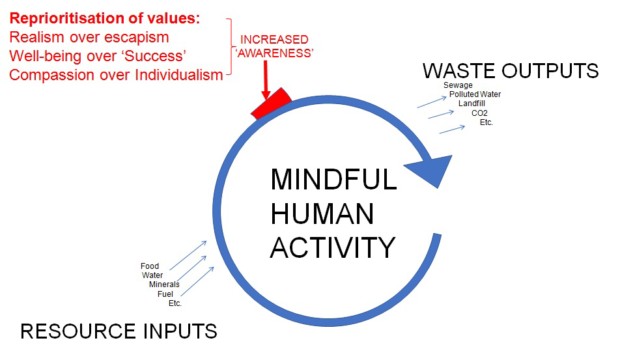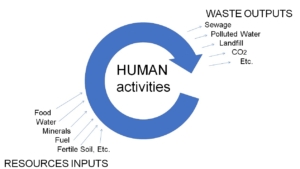
Photo : Paul Grogan
The Earth is undoubtedly facing a global environmental crisis. Human activities are changing the climate, melting the glaciers,clearing the forest, exterminating many species, creating antibiotic resistance, polluting our water sources, and moving species into new locations where their success becomes a problem. Most people are concerned about this crisis but are struggling to find effective solutions, and are greatly overwhelmed by the sheer scale and complexity of the individual problems. As a research scientist studying ecology in Europe and North America over the past 30 years, I understand these problems more than most. But I have come to learn recently through reading and hearing teachings from His Holiness the Dalai Lama that Tibetan Buddhism in particular provides a very powerful over-arching framework to address this crisis and achieve more sustainable living for our society. Why do I believe this?
Tibetan Buddhist philosophy highlights the importance and significance of interconnections – not just among peoples but also between people and their environment. We are profoundly connected to, and dependent on, the animals, plants, microbes, as well as water, soil and rocks around us. Understanding and sustaining this complex web of interconnections and interdependencies is the basis for much ecological science research, but it is also one of the fundamental bases of Buddhist philosophy. Secondly, the central concept of impermanence in Buddhism is mirrored very closely in ecology. Genes change over evolutionary time, species evolve according to changes in habitats, and new biologically-driven and physical disturbance events are frequently occurring in all the world’s ecosystems. Understanding and managing these changes and their impacts is at the heart of ecological sustainability. Thirdly, Buddhism is the most outwardly compassionate of the world’s religions. We cannot live sustainably unless we are living in a way that is compassionate to each other (e.g. that promotes and respects human rights, individual dignity, and social justice), and that is compassionate to the other species in our environment. An additional perspective promoting environmentally sustainable living is that we cannot live sustainably unless we are compassionate to the future humans that will live on Earth. In other words, if we are mindful of the negative impacts that our current environmentally destructive activities will have on future generations, then we are likely to live in a more environmentally benign way.

Photo : Paul Grogan
Western society has reached its current state of ‘progress’ by focussing primarily on the ‘parts’ rather than the ‘whole’. Extraordinary technological developments have been achieved, but they focus primarily on benefitting individuals rather than society as a whole. Consequently, we tend now to approach each environmental problem separately (e.g. developing the use of renewable solar and wind energy to replace fossil fuels). These individual initiatives are good, but they do not directly address the one fundamental issue that underlies all global environmental issues – human behaviour. How ought we to live in order to achieve an environmental and socially sustainable existence for our civilisation? The very common Buddhist mantra ‘Om Mani Padme Hum’ can be interpreted as ‘May Compassion and Wisdom arise within me’. Compassionate and wise living – truly aware and mindful of the impacts of each and all of our activities on each other, on the biotic and abiotic environment, and on future generationswould result in much slower, gentler, and therefore more mature lifestyles. This is what the Earth needs, and we can rise to the task by suppressing our base genetically driven traits for competition, greed, and population growth. Tibetan Buddhist philosophy provides a distinctive and extremely valuable perspective on how to live that matches the principles of ecologically sustainable living. Therefore, Tibetan Buddhists should be very proud of this heritage. And the rest of the world needs to wake up to its enormous potential to help humanity acknowledge and address the fundamental root cause of the global environmental crisis.

Photo : Paul Grogan
Source: Tibet Nature
By Paul Grogan
Plant and Ecosystem Ecologist
Dept. of Biology,
Queen’s University, Kingston, Canada.




 Print
Print Email
Email